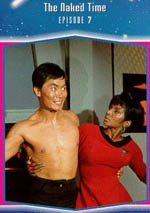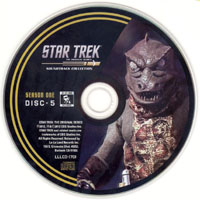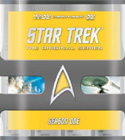
STAR TREK:
- The Original Series (TOS)
- The Animated Series
- The Movies
- The Next Generation (TNG)
- Deep Space Nine (DS9)
- Voyager
- Enterprise

THE ORIGINAL SERIES:
- Season One
- Season Two
- Season Three
- "Season Four"
Season One:
-1: "The Cage"
-2: "Where No Man Has Gone Before"
-3: "The Corbomite Maneuver"
-4: "Mudd's Women"
-5: "The Enemy Within"
-6: "The Man Trap"
-7: "The Naked Time"
-8: "Charlie X"
-9: "Balance of Terror"
-13: "The Conscience of the King"
-16: "The Menagerie"
-20: "The Alternative Factor"
----: _Time Travel Season 1
-21: "Tomorrow is Yesterday"
----: _Prime Directive Origins
-22: "The Return of the Archons"
-23: "A Taste of Armageddon"
-27: "Errand of Mercy"
-28: "The City On the Edge of Forever"
-29: "Operation -- Annihilate!"
-Season 1 Rankings

SCIENCE FICTION:
- Doctor Who
- Sliders
- The Matrix

- Main Index
- Site Map
|
Star Trek Time Travel
Season 1 (1966-1967)
"Be the change you want to see in the world."
~ Mahatma Gandhi, 20th century spiritual & political leader
|
|
|

Quite a number of fan favourite Star Trek episodes
deal with time travel, and have become exceptionally
popular with general audiences as well. What a great
pity then, that time travel is so buggered up in the
Star Trek universe.
Beginning here, we intend to launch a detailed investigation
of how time travel is portrayed in Star Trek, and note
in which episodes it works and in which episodes it doesn't.
It promises to be a controversial ride, so hang on....
"The Time Barrier's been Broken!"
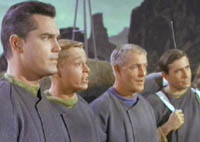
|
This offhand remark was uttered by Ltn. José Tyler
(played by Peter Duryea), a young officer
stereotypical in his over-eagerness,
who belonged to Captain Christopher Pike's crew
in the first Star Trek pilot "The Cage"
(and again in "The Menagerie Part 1"), as he
attempts to boast about the ship's speed.
Speed! We surmise that he meant to say
they had found a way to fulfill man's desire
to get to the next star without taking the years
and years that traveling at less than the speed
of light would require.
Terminology is already being applied loosely....
|

|
"Our chronometer is running... backwards!"
|
|
Star Trek was only into its seventh episode, "The Naked Time",
when something
interesting happened. The Enterprise crew accidentally
discovered a means of traveling through time, and time-travel
has been available to Starfleet ever since.
Of course, since time-travel also happens to scare the willies
out of Starfleet personnel, and they usually have many other
areas of concern, they don't use it or explore it very often.
Perhaps this is a good thing.
No, Mr. Spock did not invent a new engine formula in three
minutes flat while intoxicated, although considering where
this is headed, that might have explained a few things.
Luckily, the formula already existed as an untested theory
in Starfleet computer records. Trust Captain Kirk to be the
one to give it a whirl.
Predictably enough, this harmless little trip back in time
is preceded by an increase in speed until the ship is
"now traveling faster than is possible for normal space."
Arrgh! Why does
everyone believe that incredible speeds can cause time
travel? I could write a whole article on that misperception...
In fact, I already did:
"The Unraveling of E=mc2". If you're
interested in the debate, check out the section under the
heading "The Perception of the Speed of Light". Actually,
read the whole wonderful thing; it's good stuff. ;-)
|
|
Upon discovering that they've traveled back in time some three
days, Captain Kirk moons over the thought of reliving all the
interpersonal turmoil and shipboard danger of those three days
again.
Duhh! It's the rest of the universe at large that will
be seen to relive
those three days. The Enterprise crew will experience three
NEW ones, with far different interpersonal incidents and,
now that the ship has been flung far from the star system
that had trapped it, far less shipboard danger. But more seeds
are being sown for the confusion surrounding the idea that
experience cannot be rewound and erased by the magic-wand of time....
|

|
"Tomorrow is Yesterday"
(Star Trek Episode #21 in production order)
written by D.C. Fontana
directed by Michael O'Herlihy
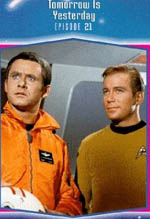
|
Star Trek's first full-blown episode devoted to a time-travel
story has a good underlying premise to it, in terms of production
value and marketability: taking the Enterprise back to what was
then the present day and having it mistaken for a U.F.O.
However, once past the teaser and opening scenes that set that
premise up, most of the rest of the story rests on nonsense
and plot-logic of the worst temporal taste.
All of the actual travel through time in this episode is accomplished
via the intense gravity from massive celestial bodies (first a newly-detected
black hole, then the sun) giving the Enterprise a rare burst of
speed. Here we go with speed again. Not all that convincing,
but at least consistent with
what was set up previously in "The Naked Time". In fact, with
this being one of those Star Trek episodes scored solely with "tracked"
music from previous episodes, they even use the same music cue
from "The Naked Time" by Alexander Courage. Nice.
|
The big problems in this story are all brought on by the Enterprise
crew's fragile misunderstanding of temporal mechanics, most of which
is spouted by Mr. Spock. In effect, they believe the version of
1960's history recorded in their computer memory banks should be the
only one "allowed" to exist, and now that they suddenly find themselves
in it, they should act as though they don't exist, leave no mark
or trace, and have no impact. Good luck.
Worse, they think they know which actions and events can "change"
the future and which ones won't, depending on the size or permanence
of the impact they are having. If they could remember their
Heisenberg principle, they would know that merely being there to
observe is enough to change the result from what it would be
if they hadn't been there. Which brings up the question of whether
or not the version of the 1960's recorded in their memory banks
originally included a visit from the Enterprise mistaken for a
U.F.O.
At least this is left up to the viewer to decide, earning the
episode a positive point.
At best, the Enterprise crew spend their time running around doing
things and saying things that make them appear foolish. Captain
Kirk gets most of the worst of this: not just by accepting Spock's
twisted view of time travel at face value, but often by buggering
that up as well and getting the crew into more and more trouble.
It's clear here that he isn't yet very familiar with what will become
staple Star Trek time theory.
Our first big facepalm occurs as we wonder why Kirk didn't think to beam
Captain Christopher out of his jet directly onto some spot on the ground,
or failing that, perhaps keep his stay in the transporter room down to
about 2 seconds before beaming him down to the surface. Even if I don't
believe in Spock's need to leave this timeline undisturbed, it's painful
to see the crew so carelessly buggering up their own goals.
Once Kirk starts blabbing on and on to Christopher in the transporter room,
that's the point when the story's fortunes tank from shaky to irretrievable,
I can't stay invested in any character's goals, or believe in their invented problems.
Although I can't bring myself to root for most of the crew's main aims
in this story, particularly their lame attempts at deception, there
is a natural flow to the nature of their results. The more they
attempt to erase all trace of their presence, the more evidence
they leave of their presence. It's good for a bit of a chuckle
in that regard, but only a bit. Most of the time they're just
pathetic, unable to give either an honest or truly entertaining
account of themselves.
It's the bizarre attempt at resolving this ever-growing mess
at the end of the episode that would stretch the limits of
believability of even the most liberal of time-travel theoreticians.
Tinker-Bell's magic wand does a really twisted number here,
whipping the Enterprise back and forth through time to all the
right moments to complete a stupendously ridiculous erasure
and render the episode's narrative into that abomination of
time-travel stories everywhere: "The Adventure That Never Happened"....
at least as far as 1960's Earth is concerned. Luckily the Enterprise
and her crew will have detailed memories and computer logs of what
went down, so it's not a complete disaster on that account.
Even after we allow the Star Trek crew to believe what they want
about time travel and act on those beliefs, on screen special effects
are brought to bear on making actual events themselves inexplicable,
most notably in this case by beaming two 1960's people into past
versions of themselves. I really don't know how anyone is supposed
to believe that is anything other than ridiculous. Two versions
of the same person forced to occupy the same time and space - how does
that not result in both being killed? Hmmm. Well, we are clearly shown
one of them at least surviving well after the incident.... which leaves
us to believe that the other one was simply vaporized. A pretty brainless
cop-out for fixing this part of the story's challenges, and it's done
twice, for two characters. Kirk and company
have actually abandoned the universe in which they "messed up" history
and abducted these two, and that history will continue with someone else's
son piloting the first Saturn probe and who knows what other differences as well.
Then upon whipping back in time, Kirk and company have begun to
follow/create/choose a new history in a parallel/branching universe
into which they tried to dump their two extra passengers - except that that universe,
that version of history, already had its own versions of those two passengers
at that time. After the beaming-merger, is the resultant Captain Christopher
the one who was just sitting in his airplane following the "U.F.O.", or is he
the one who spent half a day on the Enterprise learning about the future?
Why does this universe have an Enterprise in the atmosphere for Christopher to see
before the beaming, but not after? Have we slid to yet a third alternate universe
in the meantime?
Wow, what incredibly neat smudges
that Magic Eraser of Time can make once a really skilled magician
starts rubbing things out, and faking her way through time theory.
Good thing Mr. Spock's countdowns are so precise.
The episode is also really playing it fast and loose with Einstein's theories as well,
going backwards in time on approach to the sun, but fast forward in time
while moving away from the sun.... I really don't know how they thought that
made any sense at all.
Perhaps the episode's saving graces are the few moments of
humour that sneak into the production. In fact, if one were to
remove all of the offending time-travel plot elements from this adventure,
there probably wouldn't be anything left other than the problem
Kirk is having with the computer's new personality. Not bad,
but Star Trek has done humour better elsewhere.
The episode is also notable for introducing Transporter Chief
Kyle to the series, played by actor John Winston. An enjoyable
character whose recurrence is probably only noticed by die hard
fans, particularly as he doesn't acquire his name for several more
episodes. The first half of the story seems a bit weird in having
so many scenes in the transporter room, with apparently no one
at the controls and only the Captain on hand to greet their first
guest. Perhaps this is what prompted Fontana to create Chief Kyle
in the first place, as the transporter room scenes in the second half
work much more naturally with his added presence. Nice one.
Musically, one will find this episode helping to make cues composed
for other episodes more famous, in particular some of the more
humorous links and stings, although it can also be noted for airing
a nearly clean version of an original Fred Steiner cue
from "Mudd's Women" as
Kirk and Sulu roam around the Air Force base making as little on-set
noise as possible. I always wanted to call this cue "Alien Ground",
in an attempt to encapsulate the general mood it brought to all
its appearances in the original series,
but a rerecording of it has since been released where it is
titled: "The Venus Drug". Far more specific to its original
story, and not as exciting I think.
And when all is said and done, I remember what Gene Roddenberry asked
Michael Piller, when Piller proposed an episode that had Q leading everyone
on a fun romp through the universe. What is this story really all about?
To me, it's just a terrible mess, somewhat succeeding on the "fun" bit,
but not enough to forgive its limited thought on the concepts it tackled.
"Tomorrow Is Yesterday" does not typically rank too highly when
compared with other Star Trek episodes, and might only be considered
a weird oddity in the canon with little impact on its own, which would
probably be a good thing ....IF only the basic time-travel premise
played with here could rest in peace. Unfortunately, several episodes
later came an adventure with far, far more popularity that cemented
most of it in place....
"The City On the Edge of Forever"
(Star Trek Episode #28 in production order)
written by Harlan Ellison
directed by Joseph Pevney
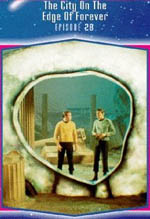
|
Star Trek's producers believed they had achieved a minor coup by
getting already decorated science fiction writer Harlan Ellison
to craft a script for them. Ellison later complained about how
his original screenplay had become so altered before it rolled
before the cameras - reportedly producer Gene Coon, story editor
D.C. Fontana, and executive producer Gene Roddenberry all had
their hands in the rewriting efforts. Whether the alterations
were for better or worse is hard to say.
What is clear is that Starfleet personnel in this story can lay
little claim to all those great and noble values that Trekkers
are fond of citing as one of their biggest reasons for loving the
show and putting it on a pedestal. Upholding their values proves
to be of secondary importance whenever the history written in
Starfleet's history books and recorded in their computer databases
is threatened - which appears exceedingly silly to anyone who has
accepted the fact that all histories exist simultaneously in parallel
universes. However, Ellison built on his backwards premise so
skilfully as a writer, delivering excitement, humour, drama, and
provoking such substantial thought, that the episode remains revered
even today.
Trekkers who are truly value-conscientious might want to think again
before voting this story into their top ten all-time original series
favourites, much less their top two as has happened in the past.
Read on to find out just how this story got it wrong....
|
Reportedly, Ellison's original screenplay had two drug-addicted
crewmen initially getting the Enterprise into trouble to start the
story off. If Roddenberry and company hadn't nixed that, the story
might rate even lower on the Starfleet values scale. But I say that
without having seen how the original portrayals were intended, and
a prior episode
"Mudd's Women" (story no. 4 in production order)
had certainly established that such a practice was sadly not unheard
of in Federation society.
And so the filmed version kicks off with an exciting bit of action
as the Enterprise explores a region of temporal disturbance. The
pace is kept up while a number of ideas are explored and several
important things happen. Dr. McCoy is quickly reduced to a random
element which the plot desperately needs to help artificially set-up
the hypothetical trick-question in the ending, and the Star Trek
team make this cliché work for them, the actors pulling all
the right faces to keep us laughing with them and on our toes as to
how the situation will unfold.
|
Refreshingly, time travel is not achieved through speed and
high-gravitational sling-shot manoeuvres. Instead, we have a mysterious
portal developed by a lost civilization. Its properties and true
purpose remain unknown, thankfully. At last a bit of space for
the audience's imagination to fill in the blanks, which new generations
will do with greater and greater sophistication as time marches on.
But the story endeavours to bring true sophistication to a halt
in other ways. The Enterprise crew's first idea of what to do
with the portal seems to be a gross misunderstanding of what it can do.
Instead of seeing a door that can lead a person unnaturally
from one position in the time/space/choice continuum to another,
they begin to think of it as a "rewind-machine" that can undo their
experiences so they can "make a different choice" and spare McCoy
his madness. Sorry, chaps, you're stuck with playing out what you've
already chosen. Anyway, the rewind idea is nothing more than wishful
thinking, by people who are allowed to be wrong. Too bad it crops
up so often in Star Trek.
|
|
One of the more striking things about this story is that it represents
Uhura's first inclusion on a landing party in the show. In one respect,
it's refreshing to see her character get more opportunity like this, but
at the same time, it's a bit baffling to figure out why it is happening now
when indeed it never happened before. The story hasn't really come up with
a significant reason for it. Nonetheless, it's kind of cool.
The plot's first true temporal gaffe occurs when McCoy's jump through
the portal into the past results in the impossibly ridiculous situation
of six Starfleet crewmembers stranded on a planet while the ship that
brought them there has never existed. In order to buy into this
situation, you have to believe the words of the
"Guardian" portal itself, though it is corroborated only by the crew's
inability to contact the ship via communicators. All kinds of other
phenomena could be causing all this, not least of which could be the
Guardian interfering to create evidence to support its own tall tale.
Captain Kirk takes a longing look into the empty sky, which is good
for the mood being created at this point, but which proves little
conclusively - a ship in orbit can easily be missed by the human eye,
particularly if it's currently above the other side of the planet at
the moment.
Now, of course, we don't buy into the idea of a single time-line
getting changed like a piece of magnetic tape getting recorded over,
but for the moment, let's pretend we do and follow through with
the line of logic started here. McCoy has managed to change
history to such an extent that Starfleet is no longer what we remember,
and the Enterprise doesn't come to the planet with the Guardian.
If that's the case, then Kirk and his landing party don't chase
McCoy down to the surface either, so they should no longer be
standing there as lonely as a dead moon. And if McCoy never gets
to the surface, he can't step through the portal to change history
anyway - so basically his influence in the past will ultimately
erase his ability to influence the past, and history changes back
again. This brings the Enterprise back to the planet and chucks
McCoy back through the portal again. The narrative is basically
stuck at this point, flipping McCoy in and out of existence. Yes,
of course it's ridiculous. Time to change our view of how the cosmos
works....
McCoy must spring from a different
time-line to the one he has affected in order to continue to
exist, and for the other time-line to continue to exist and
motivate a story.
So let's now allow multiple timelines to exist in parallel universes
separated by the choices that living creatures make all the time,
and see if that's an improvement.
With McCoy's unknown choice now branching him off onto another
timeline parallel to this one,
his "home" time-line can now remain unchanged, leaving
Kirk's party on the planet to speculate on what happened. Better.
But now, the Enterprise is also still in orbit above Kirk's party on
the planet. Once again, the story is nullified. At least this
time, there is no inexplicable magic altering the entire universe.
So what else might be going on?
At best, it can be surmised that the crew's proximity to the portal
has somehow allowed them to
"slide" into the future of a
Starfleet-less parallel timeline defined by some choices
McCoy made in the past he jumped into, whereas the Enterprise itself
did not slide along with them. The history that these six crewmembers
remember still exists perfectly safe and sound, but they are still
presented with the problem of getting back to it. And the Guardian
is a bit of a dunderhead, unable to give any helpful hints to any of
this.
Good Sense Unravelled
So inevitably, Kirk and Spock jump through into the 1930's, determined,
so they believe, to "change history back". Their first five minutes
in this new environment are a horrid display of all the good values
they will sacrifice just to get themselves and five friends back home:
they seek secrecy, hide their faces in embarrassment of who they
are, they steal, they lie, they commit assault. All for
the mistaken belief that the whole universe will disappear and go
to hell if they don't. I shudder to think the world may yet
be full of people who believe them and root for them at this point.
The production team try to keep this part humorous, with some success,
but there is better humour elsewhere in Star Trek for sure.
Hmmm, well I have to say, the concept of a story with our leads
spending most of their time in 1930's New York doesn't really provide
this sci-fi action-adventure fan with a great draw towards the story
in general. I can't say that anticipation for this story to be good
is all that strong. A lot of the potentially entertaining moments
pop up by surprise instead. I suppose if you really love this one,
you might be giddy while awaiting your favourite moments. For those of us
who don't care for it, it can actually feel a bit dull as it slowly meanders
through its pretzel of bad logic.
"Let Me Help"
|
The episode is not without a healthy smattering of good values coming
to the fore, which is one of the main things holding our attention
throughout the historical period bits, but note that it is non-futuristic,
non-Starfleet guest character Edith Keeler (played by Joan Collins) who
owns all of the actions that flow from such positive principles. Kirk and Co.
can talk just as nicely, but then proceed to act with only their
own misguided time-altering interests at heart time and again,
and we all know what they do with Edith at the end.
Now Edith herself is not perfect either. She believes a lot of
great humanitarianism is going to emerge simply by having a lot
of people become astronauts. Bizarre, but this does reflect
a common 1960's perception that has since melted away.
Anyway, no one else in the story is truly critical of Edith's
character or motivations. She is treated as a flawlessly
positive person. Then, to top it all off, Kirk adds his
thinly-motivated emotional attachment onto that. His bland
delivery of "I'm in love with Edith Keeler", only serves
to make one roll one's eyes and think, "Oh dear God, not again."
Oh well. Sixties Star Trek seems to have Kirk falling in love
with the lead guest star in every second episode, so I guess we'll
just have to put up with it - at least it wasn't quite as prevalent
in these earlier episodes as it later became, so it becomes a
little more excusable.
|
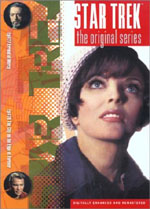
|
It isn't long before a choice concerning Edith is identified
as the point at which Kirk's home universe took a turn different
to the one that McCoy created. Much effort now goes into
creating plausible repercussions of that decision so that
it can affect Starfleet some 300 odd years later in a manner
that is OPPOSITE to what one should normally expect, opposite
to the flavour of what should flow naturally. Yes, the writers
want the trick question, for all the pseudo-cleverness and
gut-wrenching drama it can give them.
And Leonard Nimoy's calm, authoritative delivery can make even the
silliest of ideas seem logical, so it gets put to work here.
At best, it can be argued that Edith would tip the balance
between compassion and courage in the wrong direction at the
wrong time. The biggest naïvety inherent in this theory
is that the world should be as black and white, and susceptible
to the outcome of World War II, as American propaganda made it
out to be. Was America's already late entrance to the war
critical to the defeat of Germany? Seems to me they had a bigger
role to play in the defeat of Japan, while England and Europe and
Russia dealt with Germany. Would Edith's Peace Rally have had
effect on the American government, when international financial
interests were pulling the strings on all governments involved
in WWII? If that were possible, those interests would probably
have been responsible for bumping Edith off, and Kirk wouldn't
have to. (Then again, who WAS driving that truck?...) Anyway,
follow that line of logic, and Edith never makes the impact
that creates a Starfleet-less future, as the assassins come back
for her and McCoy.... And a likely outcome, no matter what Edith
does, is that the financiers pull the plug on Germany's war machine
when it gets too close.
Most of all, who is to say she can't affect German society just
as effectively as she does America? Who is to say that her astronaut
ideas don't mix enough courage in with her compassion to allow her
to present mature, well-rounded ideas? And 20-20 hindsight, with
regard to Star Trek's future history, suggests that the Eugenics
Wars pretty much wipe the political slate clean by the time
Zephram Cochrane initiates first contact, setting the formation
of the Federation and Starfleet in motion.
When all is said and done, what this adventure presents are
Starfleet characters who believe they can find their civilization
of high values by acting contrary to those values. A dumber
pretzel of metaphysical logic has never been baked, or consumed
so heartily by a genre's fans. This seems a good place to
repeat the quote appearing at the top of this and many other
pages at Lyratek.com, from one of the world's most conscientious
value-seekers:
"Be the change you want to see in the world."
~ Mahatma Gandhi, 20th century Indian spiritual & political leader
In addition to the initial spree of secrecy, self-embarrassment,
theft, lies, and assault, McCoy continues the trail of pure
negativity that Starfleet characters leave in the 1930's,
screaming like a madman and disturbing the peace, and later on
providing unsuspecting locals with a means of disintegrating
themselves. Starfleet's influence does not look at all good in this
one. No wonder they all become afraid of their natural impact.
A bad value to promote, fear of one's own honest self.
The episode also glosses over what could easily be a huge technical
problem. It's easy to see how a character can make a decision to
enter the past - just walk through the portal as the Guardian shows
the past. But considering the way you land in the past as if
coming out of nowhere, how do you get back? Is there an
invisible open time-hole in that spot, capable of taking you back
the minute you decide to step on back through? The episode
ignores that question a little too easily.
|
By far "The City on the Edge of Forever" also has the most
unnoticeable original score of Star Trek's first season,
to the extent that it took a lot of convincing before I could
acknowledge that it even had its own original music.
Fred Steiner didn't even get an on-screen credit for this one,
instead the original credits default to Alexander Courage
like on all the other tracked-only episodes of the first season.
Listening to Steiner's fresh score for this story on CD,
the first track immediately evokes an instant recognition
of the American 1930's period - only problem there is that this piece
wasn't used in the episode. Instead, Wilbur Hatch's "Humoresque"
library cue gets a bit of a showcase in its place and in a few other places
in this episode, but still doesn't feel unique because it appears
in other episodes as well.
|
|
|
Steiner's compositional efforts for the rest of his score
don't really attain their usual heights though, primarily because
someone thought it would be a great idea to borrow an actual 1930's
song for its main theme. Seems okay in theory, but the song they
chose "Goodnight, Sweetheart", once it has its somewhat applicable lyrics
stripped away for an instrumental orchestral treatment, boils down
to a nearly a one-note melody with no important emotional chord changes
behind it. Three additional composers to pay,
and this is all they had to show for their efforts?
Edith's "theme" turns out to be a non-theme, unable to
get emotionally anchored to the drama. Steiner still uses some good tricks
to make sure it never feels out of place, and that it always works,
which is great. But when sitting side by side with all the rest of
exciting music from other episodes that gets tracked in rather heavily,
Edith's "theme" is suitably buried by much more interesting, exciting
material. In this case, I really don't feel it was worth it to pay extra
royalties for this song; surely Steiner could have come up with
something much better on his own.
And then, after the climactic moments,
all is back to normal in the Star Trek future. Our heroes
have left a trail of ugly deeds across the 1930's, and feel disgusted
with themselves. As we all should with this episode.
Personally, I never would have trusted the Guardian. Its
understanding of time is suspect, and its true purpose and
motivation is unknown. I think it played Kirk and Spock like
a song for some nefarious reason, if not ignorance, and they
failed to rise above it. But the Guardian is just a Wizard-of-Oz
puppet, with Ellison and Roddenberry and crew being the men
behind the curtain. They wanted a clever, dramatic hour of TV,
and their ignorance of time is in evidence.
Sorry, but I think a sound metaphysical examination reveals
this episode to be a bit of a stinker, and Star Trek has many
finer episodes worthy of greater praise and more extensive
study.
This story's very entertaining and engaging scenes managed
to give it such a compelling sense of drama, and its
interesting ideas provoke such profound after-thought,
that it does on the surface do everything that good art should,
and this has earned the tale a long line of imitators in its wake.
However, a piece that puts misguided time theory and
trick questions that revel in their own cleverness ahead
of the good solid values that every noble Trekker wants to lay claim
to, does not deserve the high regard that is usually afforded
to this tale. Let's hope that the line of imitators dwindles
while artists get on with more sensible works.....
Unfortunately Star Trek itself got mired in the time-travel
format used here, and began churning out one story after another
that failed to look at time any differently. This is their
legacy, teetering on the "Edge of Forever".
Every once in a while, Star Trek does manage to produce a time travel
story that doesn't screw up, although whether or not Starfleet
personnel can adequately explain what's going on often becomes
a separate matter. We will find these stories and point them out
in later chapters of Star Trek Time Travel reviews.....
Read the next Star Trek review article:
Prime Directive Origins
which, amongst other things, covers episode #22: "Return of the Archons"....
"The Naked Time", "The Menagerie Parts 1 & 2",
"Tomorrow is Yesterday", and
"The City on the Edge of Forever"
are available on DVD and Blu-Ray.
Click on the Amazon symbol for the desired disc format
and location nearest you for pricing and availability:
Star Trek Season One "Purist" Standard DVD Box Set:
|
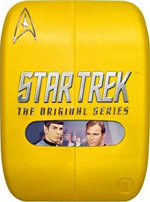
|
Watch the legend develop from its infancy.
Set contains 29 episodes from the first season
in their original wacky broadcast order,
including "The Menagerie Parts 1 & 2" which used
footage from the original unaired pilot "The Cage".
However, "The Cage" itself is only included with
the Season Three Box Set.
As someone interested in researching how the episodes
actually looked and sounded originally, and when and
exactly how certain musical cues first debuted,
this was the DVD set for me, and it remains the most
untampered-with full-season collection of Star Trek
out there. Unique extras include pure text commentaries
on select episodes.
Sadly, these sets are starting to
become rare, and prices are now rising as these
become collectors' items....
|
DVD U.S.


| DVD Canada


| DVD U.K.


|
Standard DVD Extras include:
- original restored broadcast versions of the 29 episodes.
- "The Birth of a Timeless Legacy" documentary (24 min.)
- Text only commentary by Denise & Michael Okuda
on "Where No Man Has Gone Before",
"The Menagerie Parts 1 & 2",
and "The Conscience of the King".
- "To Boldly Go" featurette (19 min.) discussing
"The Naked Time",
"City on the Edge of Forever",
"The Devil in the Dark",
and "The Squire of Gothos".
- "Reflections on Spock" featurette (12 min.)
- "Sci-Fi Visionaries" writing featurette (17 min.)
- "Life Beyond Trek: William Shatner" featurette (10 min.)
- "Red Shirt Logs" Easter Eggs (7 min. total)
- Photo Log (still menus)
- Original Trailers for every episode (1 min. each)
|
|
|
|
The Original Series Remastered Sets
The re-mastered Star Trek sets are more readily available,
and in addition to picture and sound quality restoration,
liberties have been taken with "upgrading" the episodes.
Most famously, new CGI effects and optical shots have
replaced many space scenes, matte paintings, and phaser
effects. Unlike similar upgrades applied to select
Doctor Who DVD releases since 2002,
the CGI effects cannot be turned off to see the original
effects. The kicker for me comes from reports that the episodes
have been rescored with new music. Interesting, funky, but
since it's primarily the original music I'm after in the first
place, this was not the set for me.
Another curiosity: Season One was released on double-sided
discs, with standard DVD on one side and HD on the other.
Reportedly, not all extras are accessible on the standard
DVD side. However, by the time the remastered versions of
seasons two and three were released, HD had clearly lost
the standards war to Blu-Ray, and so seasons two and three
"remastered" offer standard DVD only yet again.
|
Adding to the bizarre formatting is the very gimmicky,
awkward packaging that is prone to damage both during shipping and
with light usage. The season 1 set fares better than its counterparts
for seasons 2 or 3 though,
in having some interesting bonus features not found on any other
season one Star Trek set:
DVD/HD Combo Season 1 Exclusive extras:
- Starfleet Access interactive trivia plus picture-in-picture interviews for
"The Galileo Seven" (HD version only).
- "Beyond the Final Frontier" History Channel documentary (SD, 90 min.)
with host Leonard Nimoy.
- Trekker Connections interactive DVD game (SD side)
- Star Trek online game preview (SD, 3 min.)
|
|
|
|
Season One - Blu Ray
|
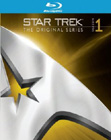
|
29 episodes @ 51 minutes
Star Trek sets are now available on Blu Ray.
Picture and sound quality restoration has gone up yet
another notch since the remastered version, as have the
liberties taken with "upgrading" the episodes.
Once again, even newer CGI effects and optical shots have
replaced many space scenes, matte paintings, and phaser
effects.... but this time the upgrades have the same respect
and user-functionality applied to select
Doctor Who DVD releases since 2002,
as the CGI effects can now be turned off to see the original
effects. Good show. It seems that the music
has still been tampered with too much for my liking though.
|
Blu-ray U.S.


| Blu-ray Canada


| Blu-ray U.K.


|
Blu-ray features add:
- option to watch episodes with original or new CGI effects.
- Spacelift: Transporting Trek into the 21st Century featurette (HD, 20 min.)
covering the restoration, CGI effects, and music upgrades.
- Starfleet Access - Okuda interactive trivia
plus picture-in-picture interviews
on 6 episodes:
- Where No Man Has Gone Before
- The Menagerie Part 1
- The Menagerie Part 2
- Balance of Terror
- Space Seed
- Errand of Mercy
- Behind-the-scenes 8mm home movies (HD, 13 min.) from
Billy Blackburn (Lt. Hadley / Gorn)
- Kiss 'N tell: Romance in the 23rd Century (8 min.)
- Interactive Enterprise Inspection (HD)
- plus all documentaries, featurettes, and episode promos
from the "purist" standard DVD set listed far above.
|
Article written by Martin Izsak.
Comments are welcome. You may contact
the author from this page:
Contact page
If you liked this article you may also enjoy reviews of the
following sci-fi time-travel / parallel history conundrums:
|









